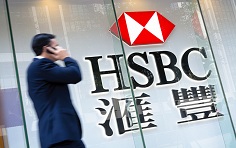ii view: HSBC plunges again after Q2 results
Credit impairment charges could hit $13 billion this year while the dividend policy is now under review.
3rd August 2020 15:50
by Keith Bowman from interactive investor
Credit impairment charges could hit $13 billion this year while the dividend policy is now under review.

Second-quarter results to 30 June 2020
- Reported revenue down 9% to $26.7 billion (£20.6 billion)
- Pre-tax profit down 65% to $4.3 billion (£3.3 billion)
- Credit impairment charge of $6.9 billion, up from $3 billion in Q1
- Previously announced - no dividend payment
Guidance:
- Expects full-year credit impairment charge between $8 billion and $13 billion
- Undertaking a review of its future dividend policy
Chief executive Noel Quinn said:
"Our first half performance was impacted by the Covid-19 pandemic, falling interest rates, increased geopolitical risk and heightened levels of market volatility. Despite this, our Asia franchise showed resilience, and our Global Markets business delivered strong growth compared with last year's first half. Having paused parts of our transformation programme in response to the Covid-19 outbreak, we now intend to accelerate implementation of the plans we announced in February. We are also looking at what additional actions we need to take in light of the new economic environment to make HSBC a stronger and more sustainable business.
"Current tensions between China and the US inevitably create challenging situations for an organisation with HSBC's footprint. We will face any political challenges that arise with a focus on the long-term needs of our customers and the best interests of our investors."
ii round-up:
Founded in 1865 in Hong Kong and now headquartered in London, HSBC serves more than 40 million customers worldwide.
It operates in over 60 countries and supports around 1.3 million businesses.
In 2019, 89% of its retail banking transactions were digital.
Services include both retail and commercial banking, global banking and markets, and wealth management.
For a round-up of these latest results, please click here.
ii view:
The strength of the bank’s Asian operations continued to shine through. A first-half pre-tax profit for the region contrasted favourably with ongoing losses in Europe. But the souring relations between the world’s two major economic powers of the US and China is beginning to cast a shadow over the outlook for the region.
Now, Covid-19 is now compounding HSBC’s challenges. Impairment provisions largely relating to the virus have risen significantly. Cuts in interest rates made to combat the crisis have eaten into group revenues, while customer uncertainty because of the pandemic has increased. Lending in the first half reduced by $18 billion and deposits grew by $93 billion as customers sat on cash.
For investors, a restarting of the bank’s transformation programme should see management’s attack on costs recommence. An increase in the bank’s capital cushion also offers reassurance regarding its finance strength, while China’s first move into the pandemic could still see it fully re-emerging out the other side before others.
But the fog of uncertainty regarding the outlook shows little sign of lifting. From tensions between Hong Kong and China to souring relations between the West and China, HSBC looks to be walking an ever more precarious tight rope. Add in both the suspension of the dividend payment and a review of future dividend policy, and investors are clearly in no rush to stock up on shares in this global banking giant.
Positives:
- A focus on Asian growth prospects
- Targeting restructuring and cost cutting
Negatives:
- Growing political tensions between the West and China
- No dividend payments during 2020
The average rating of stock market analysts:
Sell
These articles are provided for information purposes only. Occasionally, an opinion about whether to buy or sell a specific investment may be provided by third parties. The content is not intended to be a personal recommendation to buy or sell any financial instrument or product, or to adopt any investment strategy as it is not provided based on an assessment of your investing knowledge and experience, your financial situation or your investment objectives. The value of your investments, and the income derived from them, may go down as well as up. You may not get back all the money that you invest. The investments referred to in this article may not be suitable for all investors, and if in doubt, an investor should seek advice from a qualified investment adviser.
Full performance can be found on the company or index summary page on the interactive investor website. Simply click on the company's or index name highlighted in the article.